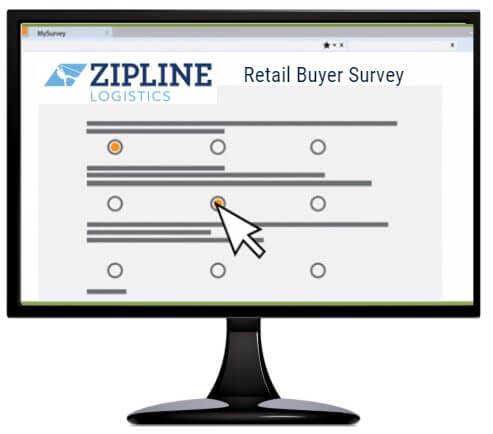
Methodology: Zipline Logistics included 300+ retail buyers in our research efforts.
Competition for grocery and retail shelf space is at an all-time high as new consumer products hit the market at record speed. Since 2013, food and beverage start-ups have raised $9.5 billion across 2,100 deals globally, according to CB Insights, pushing the pace of food innovation to an all-time high.
E-commerce has also greatly impacted the market, further increasing competition and the need to have product on the shelf. In fact, shoppers are experiencing out of stocks 33% of the time, turning to online alternatives to buy the products they need.
As a result, retailers have increased the stringency of vendor compliance programs, building in fees for underperformance. These programs exist to encourage on-time delivery of goods to prevent against out of stocks and loss of revenue to online competitors.
Hoping to gain a better understanding of the pressure retailers face, and how vendors can stand out in a competitive environment, Zipline Logistics surveyed retail buyers directly.
Retail Buyers’ Survey Insights

This makes retail buyers imperative to the success of a consumer product. They determine if a brand gets on the shelf and if they stay there. So, how can brands keep retail buyers happy?
Communication and On-Time Delivery
We asked our network of buyers this question and found that communication and on-time delivery both emerged as essential themes within survey responses. Retail buyers stated that they preferred working with vendors who communicated clear status updates and delivered product on time.
In the world of trucking, delays are bound to happen. How you handle those situations is what makes the difference between success and failure.
Retail buyers called out that proactive, thorough, and timely updates are essential to vendor relations. They like having a trustworthy point of contact that can provide status updates on orders and help solve issues if they arise. Retailers want to work with transparent, reliable brands.
Without on-time delivery and proper communication, brands run the risk of ruining retailer relationships. Survey responses showed that:
- 100% of respondents said that a vendor’s ability to deliver product on-time impacted their willingness to work with them
- 73% of respondents said they have ended vendor relationships over delivery issues
Logistics has never been more important for consumer product manufacturers. In an increasingly competitive environment – where 54.33% of buyers oversee 6 or more competing brands in one category – successful transportation is a clear advantage and differentiator. If a brand under performs when it comes to logistics, they can easily be replaced by another hot product.
Respondents called out that logistics is extremely essential, with 73.33% reporting that they work directly with their logistics colleagues at least once per week, and 40% of retail buyers doing so every day.
Establishing Optimal Minimum Order Quantities
Retail buyers also reported that they are willing to negotiate minimum order quantities (MOQs). The majority prefer for this conversation to happen at the start of a vendor relationship, but many shared that they are “Always willing” or “Very willing” to discuss MOQs and that this conversation can happen “Whenever minimums, sales, and shelf life do not work out.”
Retailers want their suppliers to deliver product on time, in full, so if renegotiating MOQs helps achieve this goal and increase profitability, they are interested in exploring the solution.
Newer brands are often forced to make the tough decision of whether they should ship a small order to a new store to test the market. These instances can often be unprofitable in the beginning. Knowing that retail buyers are willing to discuss minimum orders could be a game changer for profitability.
View the Full Retail Buyer Insights Report
Finding Success with Retail Buyers through Logistics
With competition for shelf-space rising and retail vendor guidelines tightening, successful shippers are those that take control of their logistics and find partners that can execute against strict service requirements.
Zipline Logistics is comprised of retail logistics experts who can help shippers of consumer products ace transportation into customer stores or distribution centers. Our retail-trained operations teams and service-first culture can help CPG shippers hit on-time delivery standards and establish optimal levels of communication with buyers.
Additionally, our carrier network was built specifically to meet the needs of consumer product brands. That means access to carriers that are FSMA compliant and drivers that have familiarity with retail facilities and understand the importance of on-time delivery.
—
Need help with your transportation?